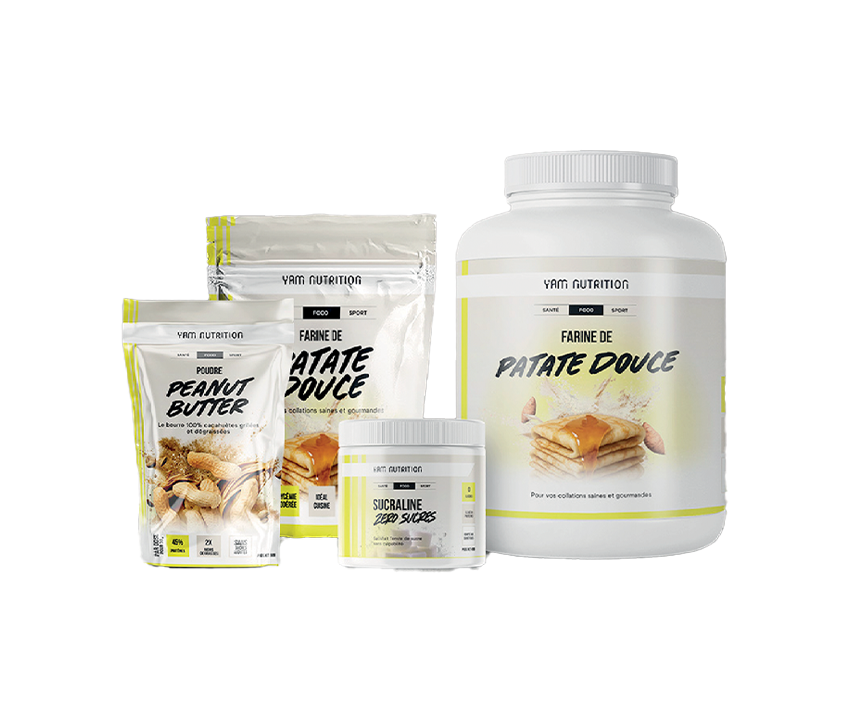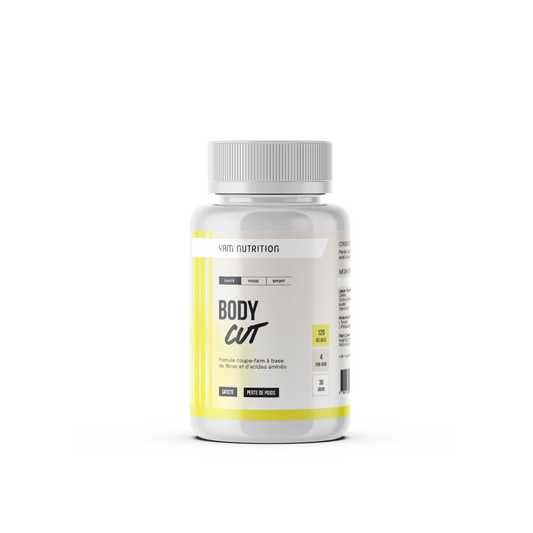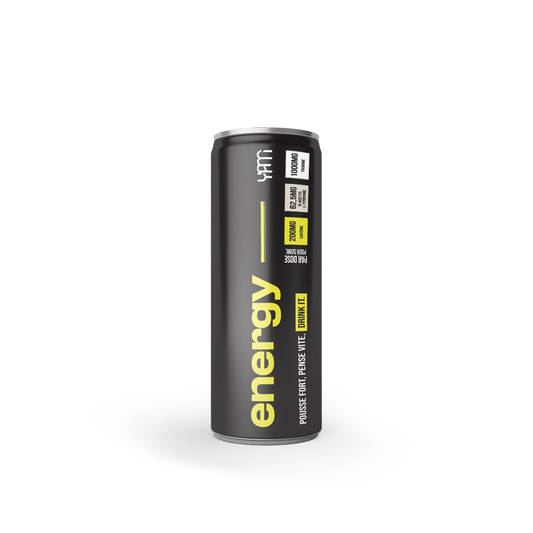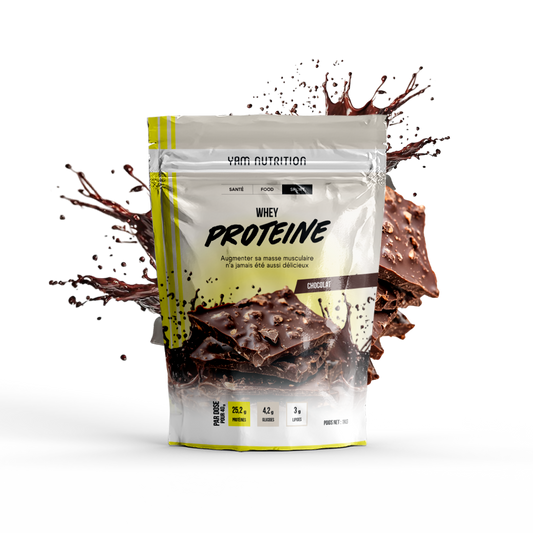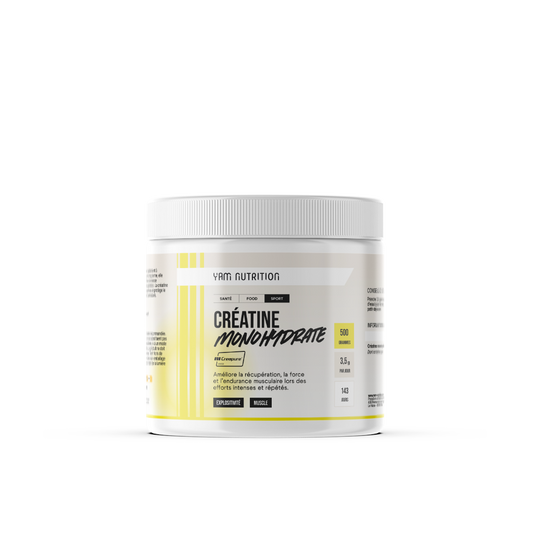Why use an energy drink before sports
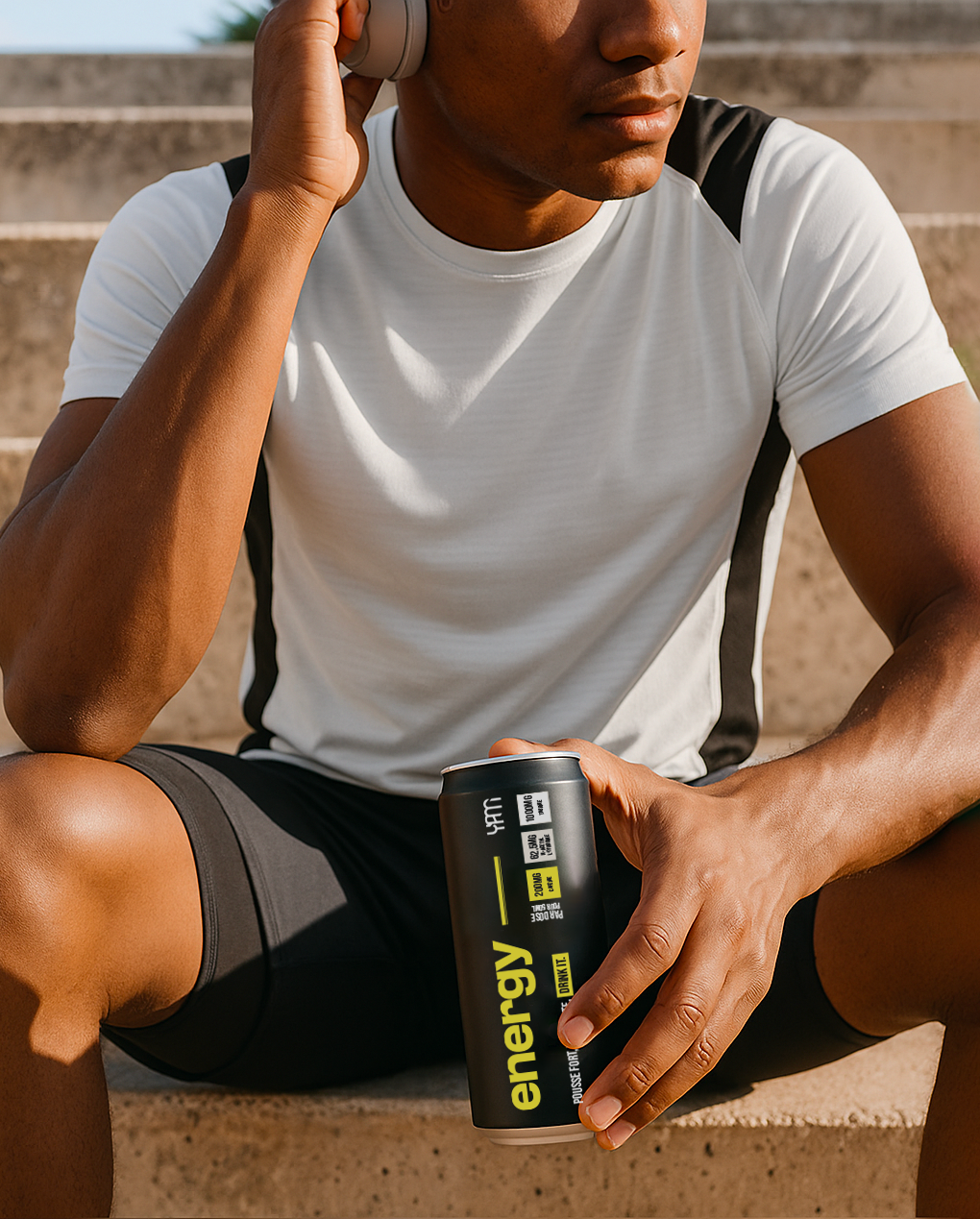
Sommaire
- Definition and composition
- History of the use of energy drinks in sports
- Benefits of energy drinks for athletes
- Improving physical performance with an energy drink
- Increased stamina
- Reduction in the perception of effort
- How energy drinks affect the body
- Mechanisms of action of caffeine and other stimulants
- Immediate effects on energy metabolism
- Impact on post-exercise muscle recovery
- Considerations and Precautions
- Optimal dosage and timing for consuming an energy drink or energizing drink...
- Risks associated with excessive consumption of energy drinks
- Recommendation for the safe use of energy drinks
- Alternatives to energy drinks
- Other sources of caffeine suitable for athletes
- Can an energy drink replace a caffeinated pre-workout?
- Nutritional supplements for energy and endurance
- Energy, the optimal energy drink by YAM Nutrition
Energy drinks are, as their name suggests, drinks that provide energy to the body. This concept is very old, dating back several centuries, as man has always sought ways to release more energy to become stronger, more enduring, more motivated, or more aggressive towards a potential opponent. Thus, these drinks are drunk outside of a meal in order to provide energy quickly. They act on the nervous system because they often contain caffeine and other similar stimulants. They may contain plant extracts, vitamins and specially selected minerals for energy purposes. These can be energy drinks or energizing drinks, but the two terms refer to different drinks.
Caffeine without the crash thanks to NewCaff-75™ technology An appetite suppressant to help you stick to your diet without giving in by regulating your appetite. The energy drink 2.5x more caffeinated than average Building muscle mass has never been so delicious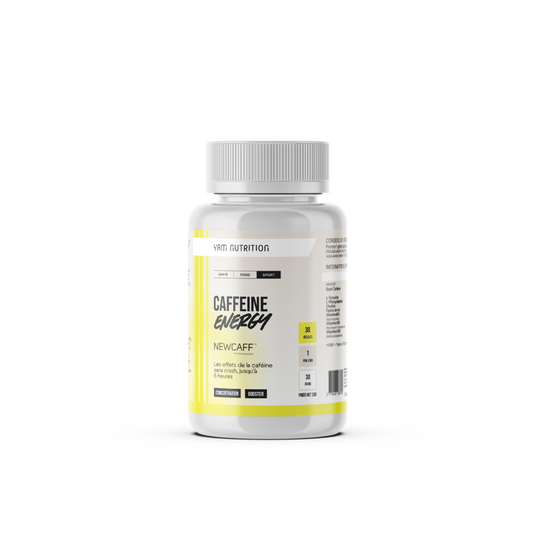
Caffeine Energy
29,90 €
Sale price
25,40 €
Body Cut Appetite Suppressant
Sale price
29,90 €
YAM Energy Drink
Sale price
From 3,00 €
Whey Protein
Sale price
From 37,90 €
Definition and composition
An energy drink differs from an energy drink in several ways. The former provides energy in the form of calories (carbohydrates, glucose, protein or fats), while energy drinks contain stimulants such as caffeine and other substances that will affect the energy release from calories already present in the body. An energy drink most often contains glucose or other simple sugars . However, a random supply of glucose in the stomach could disrupt the body during exercise by creating bloating. In this case, these drinks are called isotonic, that is, they respect the internal balance of the body by providing nutrients while promoting hydration without forcing the stomach to retain components to be digested during intense physical activity. This problem does not arise for an energy drink since it does not provide calories or nutrients to be digested. Thus, isotonic or energy drinks do not disrupt the body during physical training.
In addition, carbohydrate drinks, called energy , may also contain caffeine or other stimulants . In doing so, energy drinks also provide non-caloric components to support energy release during exercise. In both cases, these beverages, whether flavored or not, aim to replace minerals and water lost during exercise (hydration effect).
History of the use of energy drinks in sports
The very recent marketing of energy drinks or energizing drinks would tend to make you believe that these drinks are recent arrivals on the sports market. However, this is far from being the case, drinks have always been more or less associated with a hydrating or energizing effect since antiquity. However, it was not until the 19th century that people began to question the effects of an energy drink on athletic performance. Somewhat ironically, and through ignorance of medicine, many people considered alcohol to be a good way to provide the body with energy. In fact, alcohol was seen as an effective pick-me-up when consumed during prolonged exercise. At the very beginning of the 20th century, it was not uncommon to see cyclists in the Tour de France drinking beer at the end of a stage in the hope of facilitating post-race recovery.
Benefits of energy drinks for athletes
Nowadays, many athletes consume an energy drink or energy drink before or during exercise. These drinks have certain advantages. The first of these advantages is to provide energy . to working muscles through the glucose, fructose, dextrose or amino acids contained in energy drinks. On the other hand, energy drinks stimulate the oxidation of calories already present in the body, especially when they contain stimulants such as caffeine and other similar substances. In both cases, scientific studies find that energy and energy drinks help improve physical performance, increase endurance and reduce the perception of exhaustion of effort.
Improved physical performance with an energy drink
Energy drinks help maintain or improve physical performance because they provide calories that are quickly absorbed by the body and working muscles. The added micronutrients (vitamins and/or minerals) also contribute to the development of performance during exercise because they contribute to cellular hydration ( potassium , sodium, etc.) as well as to the generation of energy cofactors (NAD with vitamin B3 , FAD with vitamin B2, etc.). In terms of athletic performance, this can be an improvement in endurance or physical strength.
The disadvantage of these drinks is that they provide a certain amount of calories, and it is difficult to know if they will be fully used during exercise. Abusing these drinks could therefore also lead to excessive carbohydrate consumption if the intensity or volume of the exercises performed is not sufficient. While it is difficult to establish this among regular athletes, these carbohydrate drinks can especially pose a health problem for sedentary people. In contrast, energy drinks do not contain calories and therefore do not pose this type of problem. On the other hand, the high amount of caffeine contained in an energy drink could be the source of health problems linked to an excessive intake of nervous system stimulants. It is therefore important to consume them with pleasure but also in moderation, especially if you are sensitive to the effects of caffeine...
Read also: Strength Training Intensity Techniques That Make You Gain Muscle Mass
Increased stamina
The intake of carbohydrates or caffeine in energy drinks or energy drinks allows for an increase in endurance because they provide calories and/or stimulants before or during exercise. Muscular endurance and resistance to effort is then observed, both empirically by the athletes themselves and clinically by the studies that have been carried out on this subject. This can be pure endurance over short, medium or long distances (running, cycling, swimming, etc.) or muscular endurance of strength exercises by increasing exercise repetitions.
Reduction in the perception of effort
Since these drinks provide quickly absorbed calories or contain stimulants that activate energy release, the perception of effort and the feeling of fatigue are delayed. However, it is important to be very careful since the body's fatigue must always be compensated. Drinking an energy drink does not allow your body to overcome fatigue, contrary to what many athletes believe. Be aware that if you release more energy, it means that the post-workout recovery will be longer. Nervous and physiological fatigue is comparable to a debt, it will always have to be repaid...
How energy drinks affect the body
Energy drinks provide calories that can be used directly during training to maintain or improve physical performance or to prolong the exercise duration . This will have two major consequences. On the one hand, it means that this type of drink should never compensate for a nutritional deficiency. This therefore implies that your carbohydrate, protein and lipid intake must be ensured during the day in order to provide the energy necessary for optimal execution of your exercises. Energy drinks contribute to muscle energy synthesis at the time of exercise in order to optimize it, but they do not replace your daily diet.
On the other hand, it would be better to consider the total calories provided by these drinks during the day. There is no guarantee that fast sugars will be fully assimilated during training, no matter how intense it may be. Thus, in some cases, an energy drink dosed too generously could increase body fat storage. Remember that your weight depends on the difference between calories stored and calories expended. Energy drinks do not pose this problem since they do not contain carbohydrates. However, they can contain a potentially high amount of stimulants or caffeine. It is therefore advisable to remain cautious and avoid overdoses in order to fully benefit from their effects on the body and athletic performance.
Mechanisms of action of caffeine and other stimulants
Caffeine is a nervous system stimulant, which means it will affect energy release in several ways. For example, it promotes the use of fat while reducing the supply of glucose to synthesize a large amount of muscle ATP. In addition, it stimulates the release of adrenaline and noradrenaline, neurotransmitters linked to the body's emergency response through the rapid mobilization of energy substrates (fatty acids in this case). But by activating the nervous system, caffeine increases heart rate, raises blood pressure, and could cause unwanted side effects when taken in excess. That said, stimulants can mobilize more calories efficiently and more quickly than any other natural means of acting on metabolism.
Immediate effects on energy metabolism
The effects of an energy drink are not immediate, but they are rapid because it is consumed on an empty stomach. In this case, carbohydrates are quickly assimilated because they are often maltodextrin, fructose, or dextrose. Vitamins and minerals also support energy synthesis. Isotonic drinks, the calories they provide, maintain ATP synthesis to continue exercising further, with increased endurance. These drinks will maintain the body's hydration by providing electrolytes and minerals at the cellular level.
Impact on post-exercise muscle recovery
Energy drinks and power drinks have different effects on post-exercise recovery. The advantage of energy drinks lies in the amount of glucose, dextrose or maltodextrin they contain. This can be an advantage for the athlete because scientific research has shown that carbohydrate intake during exercise slows the release of cortisol linked to high-intensity exercise. In other words, this carbohydrate intake during exercise would reduce the catabolism of muscle fibers. On the other hand, if energy drinks take advantage of fat oxidation During training, they lead to a greater expenditure of calories stored in the body. Here too, this can be an advantage for athletes as long as they eat quickly after their exercises, which will also slow down catabolism. This strategy is interesting for athletes who want to dry out by optimizing the loss of body fat.
Considerations and Precautions
While energy drinks don't pose any particular health concerns when consumed during exercise, excessive consumption could cause you to consume a significant amount of sugar. Similarly, the amount of caffeine in these energy drinks could be too high during the day if you drink them too frequently. Irritability, palpitations, rapid heartbeat, or feelings of anxiety can result from an excess of nervous system stimulants like caffeine.
Optimal dosage and timing for consumption of an energy or energy drink…
It's quite difficult to establish an ideal dosage when it comes to energy drinks or energy boosts, given that energy needs during exercise differ for each athlete. It's easier to establish a limit for caffeine, even though not everyone responds the same way to stimulants. Let's say a typical dose of 200 mg of caffeine corresponds to two large cups of coffee, which is already considered a high dosage. Remember that it's not just the dosage that needs to be taken into account, but also the fact that a high dose is consumed all at once, which doesn't have the same impact on the nervous system as if you were consuming it more frequently throughout the day. For example, you could drink three cups of coffee in a day and therefore accumulate more than 300 mg of caffeine, but you do it in several doses. Conversely, taking 200 or 300 mg of caffeine all at once with an energy drink or pre-workout will have more impact on energy and athletic performance.
If you're taking an energy drink or a caffeinated energy drink, you can drink it 15 to 20 minutes before a workout. This lag period is necessary for the absorption of stimulants. If you feel the need, you can drink an energy drink when you're feeling tired, such as in the evening or late afternoon when your energy levels are lower. Our canned Energy drink was developed with this in mind. It's an easy replacement for similar, poorly formulated commercial drinks whose average taste will make you avoid these types of drinks. However, we don't recommend drinking an energy drink high in simple sugars. They only provide empty, pointless calories that will only make you hungry by reacting with insulin, the hormone that binds sugar calories in the body's cells. As a result, hunger will encourage you to eat more and snack throughout the day. This is the main disadvantage of consuming energy drinks without combining them with physical activity.
Risks associated with excessive consumption of energy drinks
Since energy drinks contain sugars, excessive consumption could lead to a risk of weight gain, especially when the daily diet is unbalanced. It is not uncommon for these drinks to be consumed in excess and recreationally, contributing to overweight, the risk of type 2 diabetes and obesity. Being rich in glucose or dextrose, they do not pose any particular problems for endurance or bodybuilding athletes when consumed before or during exercise. On the other hand, if you are If you are sedentary , these carbohydrate drinks will create an insulin spike in order to store these calories and lower blood sugar levels. Thus, you will tend to eat more on a daily basis, promoting overweight and the risk of type 2 diabetes in the medium or long term.
Recommendation for safe use energy drinks
There's nothing stopping you from drinking a carbohydrate-rich energy drink during exercise, especially if they're isotonic. They're designed for that purpose. However, there's no guarantee that the sugars they contain will be fully utilized during exercise. This will mostly depend on your daily diet. If your calorie intake is higher than your energy needs, the carbohydrates they contain won't necessarily be converted into energy, but they could also be stored. As for energy drinks, you could drink one 15 to 20 minutes before a workout or intense physical activity. However, avoid overdoing it, given the high concentration of caffeine they contain. As long as you consume them in moderation, they will not cause you any particular problems. Naturally, if you are sensitive to stimulants, we advise you to be cautious in this regard.
Alternatives to energy drinks
Excessive consumption of energy drinks could lead you to change your habits, unless you simply want to drink something else from time to time. Remember that water remains the first solution for hydration. Obviously, water rich in minerals naturally contributes to the necessary hydration of the body. That being said, other drinks can provide you with energy as an alternative. It could be as simple as a smoothie rich in fruits and vegetables. Smoothie recipes are countless. They provide you with calories in the form of sugars, fiber useful for digestion, but above all vitamins and minerals which contribute to cellular balance as well as muscle energy synthesis. They will be a change from the energy drink you frequently drink. Otherwise, a good cup of coffee or tea will provide you with caffeine and other stimulants with zero calories. Both tea and coffee contain antioxidants that are valuable for health. Green tea is also known for the famous EGCG it contains (galocatechins).
Other sources of caffeine suitable for athletes
Naturally, coffee and tea are the most common natural sources of caffeine. Guarana is a plant that contains a high concentration of it, but it is not widely available in the form of an energy drink. Similarly, there are a multitude of coffee and tea varieties (green, black, white, etc.) that will allow you to vary the taste and enjoyment. Another health bonus not to be overlooked is that tea and coffee contain high-potency antioxidants that play a significant role in fighting free radicals at the cellular level. Coffee is rich in tannins and caffeic acid, while tea is known for the polyphenols and catechins ( EGCG , etc.) it contains. Thus, tea and coffee provide you with caffeine but also a good amount of antioxidants which help maintain your health.
Can an energy drink replace a caffeinated pre-workout?
Can an energy drink replace a caffeinated pre-workout powder given that they contain stimulants and caffeine? It all depends on the type of sports training you are going to do. If you are practicing an endurance sport, an energy drink will be more suitable since pre-workout formulas contain arginine and other molecules that stimulate muscle congestion. Regarding endurance, muscle congestion is not sought because it would be counterproductive. On the other hand, if you are doing bodybuilding or strength, a pre-workout will be more interesting given that its formula will have been developed for bodybuilding (creatine, citrulline, arginine, caffeine, etc.). A caffeinated pre-workout will therefore provide you with more specific nutrients and will help you perform better bodybuilding workouts compared to an energy drink. That said, it can also be drunk before a bodybuilding session if you are mainly looking to benefit from the effects of caffeine.
If you prefer classic formulas to take before strength training, Bombi is a pre-workout based on essential amino acids , caffeine, arginine, tyrosine, citrulline, beta-alanine and taurine to energize your intense bodybuilding sessions. If you prefer formulas hyper-concentrated in caffeine and nutrients, the Mawashi Shot can be taken anywhere and will take up little space in your bag. Half a bottle is enough to provide you with 200 mg of caffeine, inosine, L-Citrulline malate, taurine and beta-alanine…
Nutritional supplements for energy and endurance
In addition to drinks, there are many nutritional supplements that will help you release energy. This is the case, for example, for multivitamins, especially for the B vitamins they contain. Thus, vitamin B1 (thiamine), B2 (riboflavin), B3 (niacin or niacinamide), B5 (pantothenic acid), B6 (pyridoxine), B8 (folic acid), and B12 (cobalamin) are necessary for the synthesis of cellular energy. They act as enzyme cofactors that break down proteins, carbohydrates, and lipids in energy.
To this end, YAM Nutrition has developed several food supplements focused on energy release. This is particularly the case with Caffeine Energy, which provides you with 195 mg of slow-release caffeine per capsule, with tyrosine, phenylalanine, choline, and B vitamins for optimal calorie utilization. If you are looking for a formula that reduces fatigue for several hours, Caffeine Energy from YAM Nutrition will meet your needs…
Energy, the optimal energy drink by YAM Nutrition
Energy by YAM Nutrition is a caffeinated energy drink that can be drunk before endurance exercise, running, cycling, swimming, or even football or other sports where endurance is the main focus. It provides you with 200 mg of caffeine with 1000 mg of taurine and tyrosine for a better synergy of effects. With vitamins B5, B6 and B12 that intervene in the management of the nervous system, Energy is ideal for fighting fatigue, in the evening or to accompany you during an intense exercise session...
